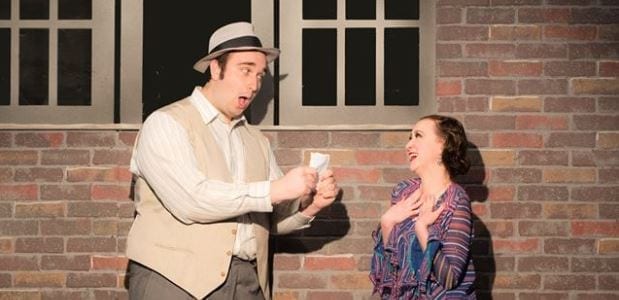OGDEN — In the living room of the Long Island beach house occasionally inhabited by the wealthy playboy Jimmy Winter, there stands a purple polyester couch. It resembles a piece of furniture recently excavated from someone’s basement, the kind whose cavernous hide-a-bed bowels preserve such relics as popcorn kernels, candy wrappers, $1.67 in change, and the Nintendo controller that has been missing since the ‘80s. The creative team behind Weber State’s production of Joe DiPietro’s Nice Work If You Can Get It has tried to retrofit it for the Prohibition era by dressing it up with gold scrollwork across the back and on the arm rests, but to no avail. Similarly, Nice Work — a contemporary show — tries to mimic the Cole Porter and Irving Berlin musicals of the 1920s via a jukebox score by George and Ira Gershwin, flappers, and bootleg booze. Yet, like Jimmy’s sofa, it cannot pull off the illusion. Unfortunately, neither Jim Christian’s admirable direction and choreography nor the cast’s impressive depth can overcome the show’s inherent flaws and some poorly realized technical elements.

Show closes March 5, 2016.
Set in 1927 at the height of Prohibition, the action in Nice Work revolves around the decision of bootleggers Billie Bendix (played by Lindsay Blackman), Cookie McGee (Colton Ward), and Duke Mahoney (Matthew Baxter) to stash 400 cases of gin in the cellar of the seldom-used Long Island mansion belonging to Jimmy Winter (Juston LeBaron). Much to their annoyance, however, Jimmy shows up unexpectedly to kick off his honeymoon with his brand-new third wife, the well-known interpreter of modern dance, Eileen Evergreen (Kaitlyn Hipwell). Soon thereafter, Jimmy learns that his second wife hadn’t signed the annulment papers in time for the ceremony, so Eileen’s father, Senator Max Evergreen (Patrick Kibbie), and her aunt, Duchess Estonia Dulworth (Kaylee Orr), a leading Prohibitionist, also come down to the house to attend a wedding do-over. Hijinks ensue as the bootleggers are forced to pretend to be the domestic servants, Billie and Jimmy find themselves spending a lot of time together, coincidences pile up, and unexpected connections come to light.
Nice Work If You Can Get It aims to emulate the Princess Theatre-style shows of the 1920s, which leaned heavily on farce, style, and charm. Librettist Joe DiPietro attempts to do more or less what Ken Ludwig accomplished in 1992 with Crazy for You: take an old Gershwin show (1930’s Girl Crazy in Ludwig’s case; 1926’s Oh, Kay! in DiPietro’s), strip it for parts, combine what’s left with a dozen or so Gershwin hits from other sources, then write a script that can string it all together.
To be fair to DiPietro, this approach isn’t as cynical as it sounds. The music first, plot later process was common in the ‘20s. Nice Work’s own source material, Oh, Kay!, for example, was conceived as a star vehicle for Gertrude Lawrence and the Gershwins wrote the score in advance of P. G. Wodehouse and Guy Bolton’s book. Besides, major revisions to existing scripts during this time have been known to turn out well (see Anything Goes, also originally by Wodehouse and Bolton). Furthermore, prominent revivals of shows from this and subsequent periods have established a long tradition of further tinkering each time they are produced.

Director Jim Christian with the principal cast of Nice Work If You Can Get It.
In any case, DiPietro’s alchemical method isn’t unprecedented. Unfortunately, however, his efforts, which culminated in a Broadway production in 2012, can’t quite transform Nice Work’s disparate ingredients into something coherent. While the resulting show does manage to produce several amusing moments and characters, they don’t always feel tethered to each other or the score — even for an era and style in which song relevance to plot and character is not a major concern. A tailor-made script would be par for the course for a musical like this, but on too many occasions DiPietro indulges in what amounts to dramaturgical gerrymandering. For example, early in the show, Billie sings “Someone to Watch Over Me,” a lyric that is completely wrong for her strong-willed, independent character. The script winks at this incongruence by having her sing it dressed as a man (props to Blackman for her manspreading) with a gun in her hand. By itself, it’s a cute moment, but the deliberately ironic context designed to make it work only serves to distance it from the rest of the show’s frame of reference. It veers from emulation into parody, more Spamalot than Fred Astaire. Conversely, Eileen’s bathtub number, “Delishious,” despite being little more than an excuse to dress chorus girls in bubbles, feels more in harmony with its surroundings.
The challenges of the material notwithstanding, director Jim Christian, who is helming his final show after 27 years at Weber State, deserves considerable credit for stretching his cast’s talents, maintaining a brisk pace, and devising the terrific choreography. If Nice Work proves anything, it’s the impact of a good director. The cast represents a spectrum of acting ability, but it is obvious that quality training and Christian’s detail-oriented direction have brought out the best in the actors. Even the chorus’s dance numbers, which can so easily be a weak link, were tight, dynamic, and exciting.
Blackman exudes tomboyish charm as Billie, and her singing does the score justice, both in her ballads as well as when she widens her vibrato for songs like “Treat Me Rough.” She keeps good company alongside a corps of strong vocal performances from the female cast — particularly Hipwell’s quirky take on Eileen Evergreen and Orr’s repressed Duchess Estonia Dulworth.

The best thing I can say in favor of Weber’s decision to put Nice Work If You Can Get It on the performance calendar is that it provides so many supporting character roles to showcase the depth of their program. Ward’s scrappy Cookie McGee props up several of the better comedic sequences with sly timing and a barely contained, manic energy. Baxter’s sensitive Duke Mahoney and Cory Thompson’s amiably Irish Chief Barry add texture to the cast as counterpoints to McGee. As for the explosive Shelby Hovley, who plays the object of Duke’s affection, Jeannie Muldoon, she delivers a profession of royal ambition that may be the best line reading in the show.
Nevertheless, since Nice Work’s entire existence is owed to its music, the production’s highest priority must be to ensure a stellar presentation of the score. Unfortunately, Weber has not given Christian or his cast the resources necessary to succeed. The Allred Theater’s sound system severely dampens the songs’ impact. The amplification for the eight-piece combo in the pit (as well as the offstage cues) makes them sound as if they are being processed through a trumpet mute. When, in the song “By Strauss,” Estonia sings that “Gershwin keeps pounding on tin,” the description is uncomfortably apt.
Beyond the importance of the music, Nice Work, as a representative of a musical tradition whose substance is style, cannot afford to cut corners on visuals. Van Tinkham and Korey Lamb’s renditions of the mansion’s dining room and exterior adequately contribute to an atmosphere of high class farce. However, in addition to the aforementioned purple couch (which has no place in any university production in the state of Utah), too many other set pieces, such as Jimmy’s bedroom, look gauche, flimsy, and scarcely improve on a bare stage.
When Nice Work does work, it is chiefly because the cast and director have managed to transcend lesser material for a moment or two; but moments they remain, and the aggregate doesn’t conjure up enough synergy to salvage DiPietro’s script. Like the golden scrollwork on Jimmy Winter’s sofa, their own nice work would have been better served with a higher quality foundation on which to build.





